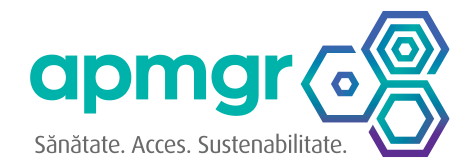- Imposing claw back tax corresponding for the first semester of 2012 will conduct to the total disappearance from the market of some medicines and to the insolvency of the manufacturers for generic, majority of those having important production units in Romania.
- The most vulnerable social groups will be affected, as the majority of the drugs at affordable prices which may disappear from the market are for heart disease, rheumatic, respiratory conditions, as well as inexpensive antibiotics.
- The financial collapse of the local producers will lead to a blocking of projected investments for the current year and to a reduction of generic drug production with affordable prices, with immediate consequence in the increase unemployment rate as well as reducing the public revenues.
BUCHAREST, 16TH MAY 2012– Member companies of APMGR ask the Government for the immediate suspension of the OUG 77 (Government Emergency Ordinance) and 110/2011, on claw back tax and starting discussions to identify a viable solution, for the patients’ interests and Romanian economy. ,
“What we were warning about two months ago became a reality as of today. The quantum of claw back tax corresponding to 1st semester of 2012 is almost double compared to the value of the tax communicated in semester 4 of 2011 (which represented between 17 and 20 % of the each producer’s turnover). Imposing this will have social and economical consequences of serious importance” declared Dragos Damian, President of APMGR.
In the first place population will be affected, by the partial or total disappearance from the market of some accessible priced drugs. The impact on companies producing generic drugs will be as serious, since a large number of them have production units throughout Romania. Insolvency of these companies equates the disappearance of Romanian drug industry.
Formost generic drugs producersavoiding insolvency will only be possible by reducing the production of subsidized drugs. This will lead to disappearance from the local market of Romanian drugs and drugs sold at affordable prices. The most affected social categories will be the most vulnerable ones, since the majority of these drugs are for heart disease, rheumatism, respiratory system, as well as antibiotics at affordable prices.
APMGR requests the immediate intervention of the new Government and personally Mr. Victor Ponta, Romanian Prime Minister, to avoid a catastrophic situation for both patients and the pharmacy industry. Until identifying a viable solution enforcing OUG 77 and 110/2011 must be suspended.
In its present form the claw back tax is unfair and unsustainable because:
- It is applied to producers, but it has as basis for taxation the shelf price, which includes the distributors’ markup, the markup added by pharmacies and VAT;
- It is calculated in a non-transparent way, containing significant inadvertence in the payment notices sent by CNAS to payers.
- It creates serious cash flow problems at company level, caused by the inconsistency between the date of tax payment and the date of collecting the amounts reimbursed by CNAS;
- The tax is applied to all those who hold a market authorization for selling medicines, despite their specificity, innovative or generics. As it is, it makes for an extra financial burden on the domestic pharma producers, that are obliged to pay for an increase in the sales of innovative medicines, in their value.
“We Hope that the new Administration will obey the principles assumed when it was in opposition, as well as those stipulated in the present governing program, and to act quickly for resuscitationof the Health system,” declared Damian.
To achieve a health system at European level one should take into account the tendencies seen in other member states of EU which managed to reduce government spending by encouraging the use of generic drugs, ensuring at the same time access to medical treatment for a larger number of patients.
In order to obtain similar results it is important to support the field of generic drugs in Romania, by implementing a few national policies that may favor the increaseof generic drug use (including a formula for the claw back contribution that can stimulate the use of generic drugs), by increasing competivity on the market and stimulating local investments in this field.
